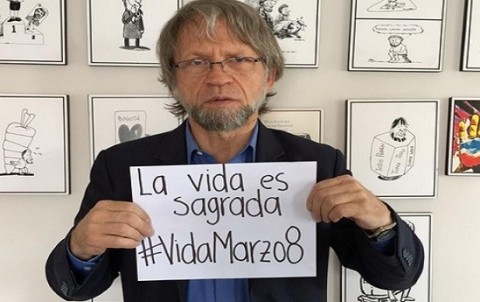Guest-blogger Emma Hattemer reviews an October 9 conference at the Open Society Foundation-New York featuring Antanas Mockus, former mayor of Bogotá, Colombia. The small afternoon event was co-sponsored by the Urban Democracy Lab and also included Andrea Batista Schlesinger, Deputy Director of US Programs at the OSF and Pedro Abramovay, Regional Director for Latin America and the Caribbean, OSF.
Antanus Mockus is known for the light-hearted humor and cheerful spirit he displayed as mayor of Bogotá: from wearing a cape and calling himself a “Super Citizen” to hiring mimes who playfully mocked jaywalking citizens, Mockus took an original and creative approach to leading his city. However, his innovation was not chiefly aimed at superficial issues: Mockus’s primary goal was to reduce Bogotá’s high homicide rate. He ultimately accomplished this through a variety of groundbreaking approaches, including implementing symbolic public art and emphasizing community unity to change the cultural understanding of the sacrament of life.
Mockus began by discussing the asymmetry between the individual citizen’s self-conception and conception of others with regard to motivation. Each citizen believes herself regulated by morality, but considers others to be regulated by the law—she identifies as a moral subject, but posits others as legal subjects who act out of fear of punishment. Mockus argues that this asymmetry explains why citizens endorse guilt, rejection and prison as regulation techniques, despite denying a “need” for such measures themselves. He believes this attitude can be combated by celebrating and recognizing the small civil acts of others, such as holding the door or “paying forward” a coffee.
This idea of social recognition as essential to civil society is key in Mockus’s homicide reduction plan, which he presented at an Open Society Foundation and Urban Democracy Lab co-sponsored event organized in conjunction with the 70th session of the United Nations General Assembly. First, he discussed how more secular, “self-expression”-oriented countries have high suicide rates and comparatively low homicide rates, while traditional, religious, and “survival”-oriented countries have high homicide rates and lower suicide rates. Colombia is an example of the latter: Latin America has 8% of the world’s population but 33% of the homicides. Although some argue that this is due to impunity (90% of homicides do not generate convictions), Mockus believes impunity is just another symptom of the underlying problem: a cultural naturalization and acceptance of homicide. Lives, especially Afro-Colombian lives and those of other ethnic minorities, are considered disposable. Therefore, the homicide rate can only be reduced by changing the culture—and for Mockus, this change involves emphasizing the idea that life is sacred.
Mockus presented pictures of artwork, from public monuments to compact mirror cases, displaying the message “Your life is sacred.” He outlined what he calls his “Uber method of citizenship by turns,” which would provide availability, transparency, and the “beauty of collective participation.” Citizens would aid each other, and become engaged in reducing the homicide and suicide rates by forming an agreement: “We won’t kill ourselves or others in any case.” Mockus described this entire process as “pedagogic, communicative, artistic intervention.” His message is powerful, poignant, and effective: he and his administration reduced the homicide rate in Bogotá by 70%.
Mockus’s ideas are as novel as they are beautiful. He troubles the common perception of homicide rates as reducible through increased policing or harsher laws and believes not just in the sacrament of life, but in the goodness of people.
“If you humiliate me, your life is sacred […] Depression is temporary, death isn’t. Your life is sacred […] If you hurt me or others, your life is sacred. Your life is sacred.”

